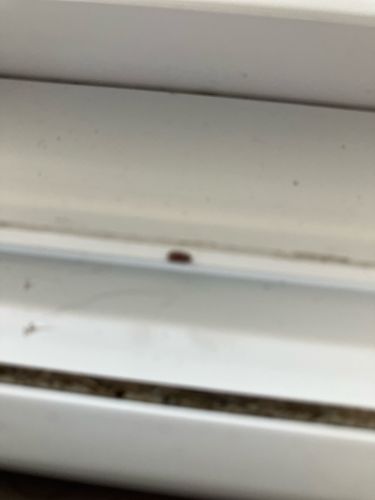Carpet Beetle (appears to be a Varied Carpet Beetle or a similar species)
Scientific Name: Likely *Anthrenus verbasci* (Varied Carpet Beetle) or *Attagenus unicolor* (Black Carpet Beetle) given the appearance, though species-specific identification is difficult from this image.
Order & Family: Order: Coleoptera, Family: Dermestidae
Size: Adults typically measure 2-5 mm in length. Larvae can be slightly longer, up to 5-6 mm.

Natural Habitat
Indoors, larvae are found in carpets, rugs, furniture, closets, attics, foundations, and sometimes in pantries. Outdoors, adults can be found on flowering plants.
Diet & Feeding
Larvae feed on a wide variety of organic materials including wool, silk, feathers, pet hair, dead insects, museum specimens, taxidermy, and various stored food products. Adult carpet beetles primarily feed on pollen and nectar.
Behavior Patterns
Carpet beetle larvae are typically found in dark, undisturbed areas where their food sources are abundant. Adults are attracted to light and are often found near windows. They undergo complete metamorphosis with eggs, larvae, pupae, and adult stages. Larvae are the most damaging stage as they actively feed on organic materials.
Risks & Benefits
Risks: Carpet beetles can cause significant damage to natural fibers in homes, including clothing, carpets, and upholstered furniture. They can also infest stored food products. Some people may also experience allergic reactions to the hairs of the larvae or their shed skins. Benefits: In nature, they play a role in decomposition, feeding on dead organic matter.
Identified on: 8/29/2025